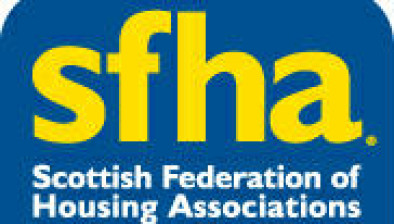Housing associations make further pitch against rent freeze as legislation is laid before Parliament

Tenants’ rights minister Patrick Harvie said some tenants are being hit with large rent increases that are hard to justify
Housing associations have joined letting agents and bodies in expressing fears that the Scottish Government’s rent freeze proposals, which are being introduced to the Scottish Parliament today, will “jeopardise” affordable housebuilding and result in a reduction in the number of properties on the market.
The Scottish Federation of Housing Associations (SFHA) has warned that the emergency legislation, which seeks to increase protection for tenants from rent rises and eviction action during the cost of living crisis, would “do little” to increase the incomes of most social housing tenants but would lead to millions of pounds being cut from housing associations’ budgets, threatening their ability to build, improve and maintain existing homes and deliver vital support services to tenants.
If approved, the Cost of Living (Tenant Protection) (Scotland) Bill will give ministers temporary power to cap rents for private and social tenancies, with this cap set at 0% – effectively freezing rents – from 6 September 2022 until at least 31 March 2023. The Bill includes the further power to maintain or vary the rent cap over two further six-month periods.
Enforcement of eviction actions resulting from the cost crisis will be prevented over the same period except in a number of specified circumstances. Damages for unlawful evictions will be increased to a maximum of 36 months’ worth of rent.
These measures will also apply to students in college or university halls of residence or other types of purpose-built accommodation.
The legislation, a highlight of Nicola Sturgeon’s Programme for Government announcement last month, includes safeguards for private sector landlords, allowing them to apply to increase rent to partially cover a limited number of specific costs including increased mortgage interest payments on the property they are letting, an increase in landlords’ insurance or increases in service charges paid as part of a tenancy, subject to an overall limit.
Safeguards for both social and private sector landlords, as well as providers of college and university halls and other purpose-built student accommodation, are included in the Bill’s provisions on evictions.
If MSPs vote in favour of treating the Bill as emergency legislation, an expedited process will see the first stage take place on Tuesday, the second on Wednesday and a final vote on Thursday.
The SFHA had already told a Holyrood committee that housing associations would not be able to build the affordable homes that are needed to tackle poverty if a proposed rent freeze is implemented.
The membership body has also written to the First Minister to call for the government to rethink the rent freeze, stating that the policy risks both its members’ ability to provide their tenants with targeted support during the cost of living crisis and the Scottish Government’s own ambitions on affordable housebuilding and climate change. SFHA will give evidence to the Scottish Parliament’s local government, housing and planning committee shortly after the legislation is published, just hours before parliament begins to debate the plans.

Sally Thomas, SFHA chief executive
Sally Thomas, SFHA chief executive, said: “We understand and share the intention to help people who are facing real poverty and desperate situations as a result of the cost of living crisis. Our members see first-hand the seriousness of the situation and are doing everything they can to support their tenants. However, the Scottish Government’s rent freeze proposals have serious, unintended consequences which must be considered.
“Housing associations are not-for-profit, charitable organisations, whose rents are consistently around half the level charged in the private sector, without any government interventions. Housing associations are required by law to set social rents in consultation with tenants, providing them with certainty about their rents as part of a tenancy that is theirs for life. As a consequence of the power to set their own rents being removed, our members will find it difficult to consult with tenants as usual and cannot plan their vital work for next year. This removes power from tenants and reduces their say in their rents and services, effectively side-lining them from the process.”
Ms Thomas added: “The majority of social tenants will see little difference to their incomes as a result of a rent freeze. This is because between 60–70% of social housing tenants have their rents covered by welfare benefits paid by the UK Government. However, with rent being a vital source of income for our members, it would result in housing associations being forced to cut back on vital support services for tenants, the development of new homes, improvements to existing stock and the pursuit of net zero targets.
“We are urging the Scottish Government to think about the longer-term consequences of any proposal for a rent freeze beyond March 2023: these could be hugely damaging for tenants. SFHA is keen to work with the Scottish Government, and other stakeholders, so that, together, we can find solutions that work for tenants, social landlords and the government.”

Brendan Fowler
Brendan Fowler, the director of Prospect Community Housing, said the imposition of rent controls will “have a significant impact on the provision of new homes” as well as making it harder for rental properties to meet green targets.
In correspondence with the Scottish Conservatives, seen by Scottish Housing News, Mr Fowler said: “We are completely against the Scottish Government proposals that were recently announced regarding a rent freeze for both the social rented sector and private rented sector.
“Whilst the current proposal ends on 31 March, and therefore will not directly affect Prospect or most other Housing Associations as our rents are reviewed on 1 April, we are concerned about what may happen after 31 March, and also the potential of future government intervention on rents. It also brings challenges in how we engage with our tenants, due to the confusion brought about from the government announcement.”
He added: “This decision by the government was made without consultation with the sector representative bodies and has resulted in much frantic activity since the announcement was made. In Scotland, we have never had government rent controls in the social sector. We are independent organisations and have been able to set our rents each year taking account of tenant feedback, affordability and the resources required to invest in our properties and build new homes. The announcement is very worrying as it goes against the historical position and brings in the real possibility of wider rent controls for our sector. This is something that will be strongly resisted.”
Prospect Community Housing indicated that its rental income will decrease significantly should this legislation come into effect. Prospect told the Scottish Conservatives that if it was forced into a rent freeze next year, this would reduce its rental income by £172,000 next year compared to the 4% cap that it is already considering. It also noted that if a freeze is imposed it is likely that housing associations will have to reduce or remove their investment. This will also have a significant impact on the provision of new homes. Lenders may be nervous about lending, or lend at a higher margin, as associations will not have the same control over their future rental income.
Mr Fowler concluded: “There has been some talk of a cap rather than a freeze after 31 March. Although this shift is better than a freeze, the sector agree that we will actively oppose any attempt by the Scottish Government to control our rents.”
Another social landlord, who asked not to be named, told the Party that the move would also reduce confidence in the sector, and further hold up maintenance projects – many of which were already delayed during the pandemic - and will impact the delivery of net-zero homes.
The association noted that should rent freezes come into effect, its financial capacity to deliver net zero homes will be impaired as planned maintenance spends will be pushed back. The association was already unable to undertake planned maintenance projects during the pandemic however such projects will be further delayed to accommodate increased running costs with no ability to increase income to help mitigate inflation.

John Blackwood, chief executive of the Scottish Association of Landlords
Scotland’s largest landlord membership organisation accused the SNP and Green Party of putting political rhetoric ahead of achieving real improvements in Scotland’s housing sector.
John Blackwood, chief executive of the Scottish Association of Landlords (SAL), said: “With this Bill, the SNP and Greens have put political rhetoric ahead of measures that would achieve real results in solving Scotland’s housing crisis.
“They have neglected the housing sector in Scotland, leaving it to crumble. Those needing a home shout for help but no-one answers. Big promises of improvements never materialise. All the while, costs rise unchecked.
“Contrast that with the overwhelming majority of landlords in Scotland whose businesses want to invest in more housing, engage closely with tenants, improve and upgrade properties and keep rent levels affordable, in the interests of both tenants and landlords.”
Mr Blackwood added: “By approaching this problem in a political way rather than as a serious policy discussion, the SNP and Greens have already caused investment to halt, with fewer homes available and people struggling to find somewhere to live. That is irresponsible whichever way you look at it.
“More than that, the policy is unravelling now it has hit the real world. The First Minister grandly announced there would be no more evictions at all but that has, thankfully, already been eroded to provide at least some basic provisions to allow landlords to protect communities from anti-social or criminal behaviour.
“The ‘rent freeze’ that was supposed to be immediate is shown not to be quite as it appeared. The scope of the Bill is muddled, the processes unclear.
“We know the SNP and Greens will ram this Bill through but that will only result in poor law. We can already see it is full of holes and may well be open to legal challenge, particularly around protection of private property and ownership.
“And for what? Cheap political headlines at the expense of actual solutions. Solutions that could have increased investment and the supply of housing while keeping rent levels affordable. The consequences of that lie firmly at the door of the SNP and Greens and their irresponsible approach to a housing crisis they have created.”
The Scottish Property Federation (SPF) has previously said that the policy would do nothing to address the existing problem of housing supply.

SPF director David Melhuish
Highlighting the SPF’s ongoing concerns, director David Melhuish said: “Scotland faces a chronic undersupply of rental housing across both public, private and student accommodation sectors, and this emergency legislation will make this situation much worse. There is a pipeline of new rented private accommodation estimated to be £3.5bn earmarked for Scotland. This could deliver thousands of new high-quality and energy-efficient homes for renters. We fear this legislation will now undermine the likelihood of many of these complex and capital-intensive projects actually being delivered any time soon.
“Housing providers are not responsible for the cost-of-living crisis but have been singled out by the Scottish Government’s proposals that miss the critical need to attract new investment to the sector. The only way that pressure will be reduced on the rented sector in Scotland is by increasing the supply of new, well-maintained and energy-efficient homes for rent. New housing must become the policy priority, not blunt instruments singling out landlords, many of whom work hard to support their tenants.
“We call on the Scottish Government to recognise the vital contribution that the rented sector makes to communities across Scotland and to support those that are looking to fund and develop new homes here. Support must now be offered to housing providers affected by any withdrawal of rent resulting from the proposed moratorium, they too are impacted by the upwards pressure on costs and rising interest rates.”
The Scottish Conservatives have demanded that ministers address fears that their proposals will end up harming tenants.
Scottish Conservative shadow cabinet secretary for social justice, housing, and local government, Miles Briggs, said: “It seems clear from industry experts that this SNP-Green scheme will only hurt the very tenants it aims to help in the long run.
“With the SNP Government already failing to meet their own housebuilding targets, policies such as this will mean less money for developments and fewer homes to live in – a shortage that could not come at a worse time.
“These serious concerns are backed by the experience of other countries where rent controls have been introduced.
“Yet SNP ministers want to plough ahead with a policy that looks superficially attractive but will, in reality, be damaging to people looking to rent.
“The best way to ensure that both tenants and the sector are getting the best deal is to ensure that housebuilding targets are met and met as soon as possible.
“The Scottish Conservatives would ensure that homebuilding is a priority for Scotland, by building 60,000 new affordable homes. That way we can help to put thousands of Scots on the property ladder. What we don’t need is the chaos and uncertainty of government-imposed rent controls.”
Tenants’ rights minister Patrick Harvie said: “The cost-of-living crisis is an emergency situation demanding an emergency response. Even as energy, food bills and other day-to-day basics become more expensive, today’s legislation freezing rents and protecting tenants from eviction will give tenants stability in their homes and confidence about their housing costs.
“People who rent their homes are more likely to live in poverty or be on low incomes than homeowners. As such they are particularly exposed to rising prices, and it is imperative that we bring in support for them urgently.
“We know that many landlords have been doing what they can to protect their tenants, but some tenants are being hit with large rent increases that are hard to justify. This legislation aims to protect all tenants from substantial increases, balancing the protections that are urgently needed for tenants with safeguards for those landlords who may also be impacted by the cost crisis.”










